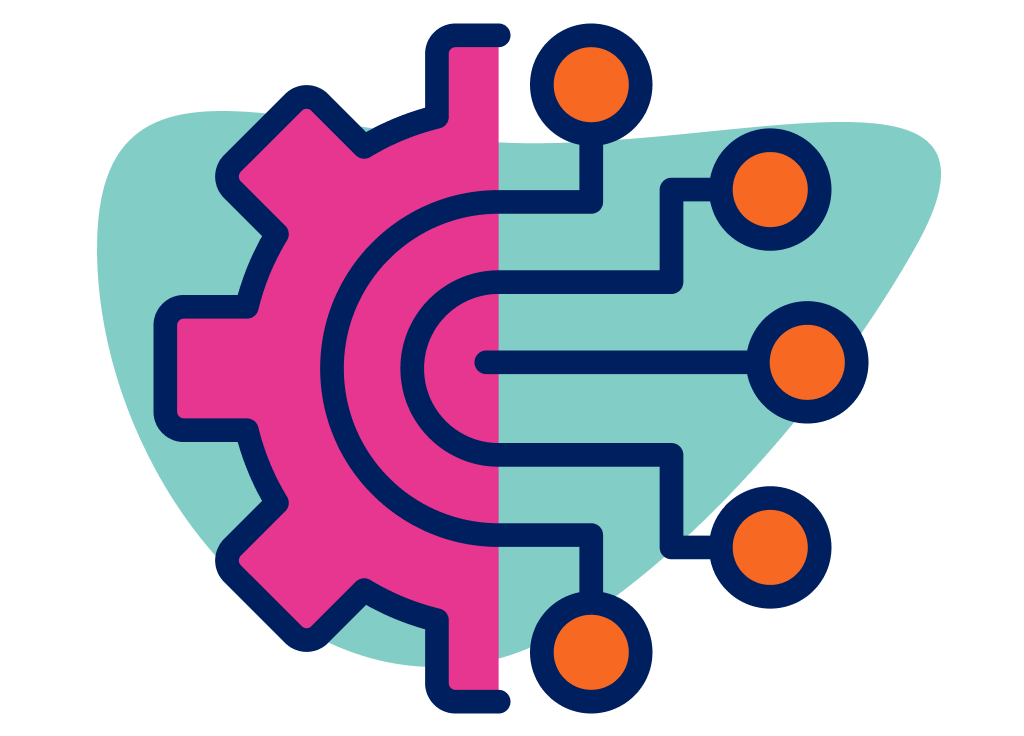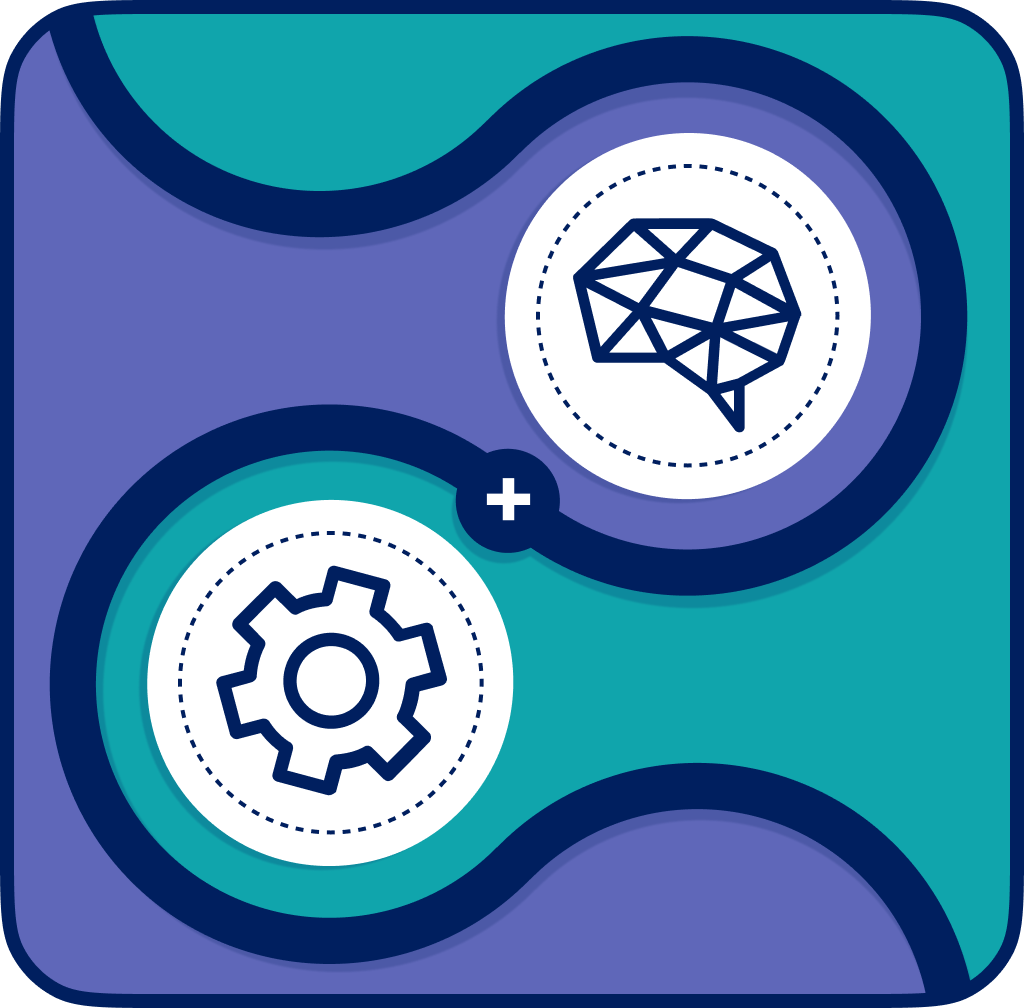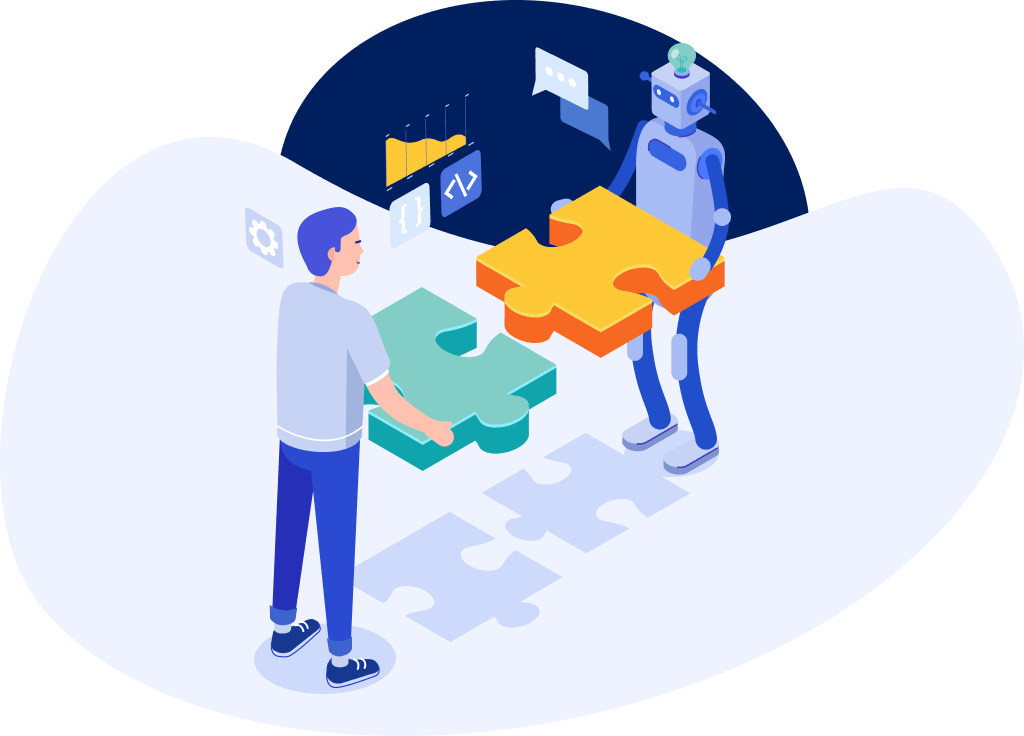
The complete guide to AI automation
Learn how the latest technologies streamline business processes and power better outcomes – at scale.

What is AI automation?
Artificial intelligence (AI) uses algorithms, machine learning, and cognitive computing to automate repetitive, rule-based, and data-intensive tasks and processes with minimal human intervention.
Together with robotic process automation (RPA), business process management (BPM), and workflow automation, AI can comprehensively optimize business processes.
- AI automation enables machines to perform intelligent actions, make decisions, and analyze data across business operations – including data analysis, customer interactions, and decisioning.
- RPA allows businesses to automate tedious processes and rule-based tasks and connect disparate systems.
- BPM provides a framework for identifying, analyzing, and optimizing end-to-end processes.
- Workflow automation streamlines workflows by completing manual steps and tasks in sequence.
By combining these powerful technologies, businesses can achieve higher levels of efficiency, accuracy, and productivity – while reducing manual effort and human error.
Why is AI important to automation?
AI automates routine processes, so people are free to focus on more important work. The result? Enhanced business productivity, cost savings, and improved customer experiences.
By analyzing large volumes of data to make predictions, AI learns from patterns to continuously self-optimize so businesses can work faster, more accurately, and at scale.
The many business benefits of AI automation
- Increased efficiency: By streamlining and automating repetitive and time-consuming tasks, employees can spend more time on strategic work and value-added activities, improving efficiency and business outcomes.
- Cost savings: Automating previously manual processes helps businesses reduce labor costs and eliminate human error. More efficient resource allocation reduces operational expenses.
- Enhanced customer experience: Delivering personalized, seamless customer experiences improves customer satisfaction and loyalty. AI automates customer interactions to provide real-time recommendations and personalized offers.
- Improved decision-making: Analyzing large volumes of data extracts valuable insights that enable data-driven decisions, identify patterns, predict outcomes, and provide recommendations for more informed, accurate decisioning.
- Risk mitigation: Analyzing vast amounts of data helps detect anomalies or patterns indicative of potential fraud. Automating compliance processes can ensure adherence to regulations and reduce compliance risk.
- Scalability: Easily adapt to changing demands and handle increased workloads, without compromising quality or efficiency. AI handles large volumes of work – scaling up or down, as needed.
- Competitive advantage: Differentiate from competitors by offering better experiences. Respond faster to customer needs, deliver personalized offers, and make more informed decisions using real-time, data-driven insights.



What’s the difference between AI and automation? How do they work together?
AI provides the intelligence and cognitive capabilities required for automation systems to understand, learn, and make decisions.
Automation performs tasks and processes based on insights and decisions provided by AI.
Together, they streamline operations and improve efficiencies so businesses can boost productivity and enhance experiences.

Transform your contact center
Deliver personalized experiences across channels with an AI-powered desktop that helps agents offer the best service.
What are the challenges of AI automation?
While the benefits are many, enterprise AI also presents unique challenges to organizations as they incorporate this powerful technology to existing structures. Addressing these potential issues requires a holistic approach that maximizes the benefits while mitigating the risks.
- Data quality and availability: Algorithms rely on high-quality, relevant data for accurate decision making. Incomplete or inconsistent data, data privacy concerns, and data silos can hinder access to required data.
- Ethical considerations: Automation can raise concerns regarding data privacy, bias, and transparency. Organizations must prioritize building trust by ensuring fair, compliant algorithms power their decisioning processes.
- Integration complexity: Ensuring compatibility and seamless integration of AI algorithms and automation tools with legacy systems, workflows, databases, and other software applications requires significant effort and skill.
- Skill and talent gap: Introducing AI within an organization requires professionals who understand both the technologies and business processes. Finding and retaining in-demand skilled talent is a must for implementation success.
- Change management and employee resistance: Communicating AI automation benefits – while providing training and support – helps employees adopt technologies and embrace change, without fearing job displacement or role changes.
- Complexity and explainability: Some decision-making AI algorithms, such as deep learning models, can be difficult to interpret. This can be challenging in regulated industries where transparency and accountability are key.
- Maintenance and updates: Keeping up with technological advancements, changing business needs, and evolving algorithms can be a challenge. AI systems require maintenance, updates, and monitoring to ensure accuracy and effectiveness.

Pega AI transforms processes across industries
Aflac’s AI automation provides policyholders with peace of mind during the moments that matter.
Elevance Health handles 40 million claims monthly using a single, unified view across the organization.
Virgin Media Ireland leverages simplified IT and integrated systems to provide consistent customer journeys.
First Citizens Bank optimizes operations with a single platform for all its servicing needs.

Discover intelligent automation
From boosting operational efficiency to driving better customer outcomes, intelligent automation makes more possible for businesses.

The future of AI automation
Continued growth and adoption, plus advancements in AI automation, presents immense potential for transformation. "Augmented intelligence" – or, the collaboration between humans and machines – will supercharge possibilities. Generative AI will also add a layer of creativity, adaptability, and personalization beyond rule-based tasks, empowering problem-solving and content-creation capabilities.
Frequently Asked Questions about AI automation

Make every customer engagement, service interaction, and workflow self-optimizing with real-time AI.

